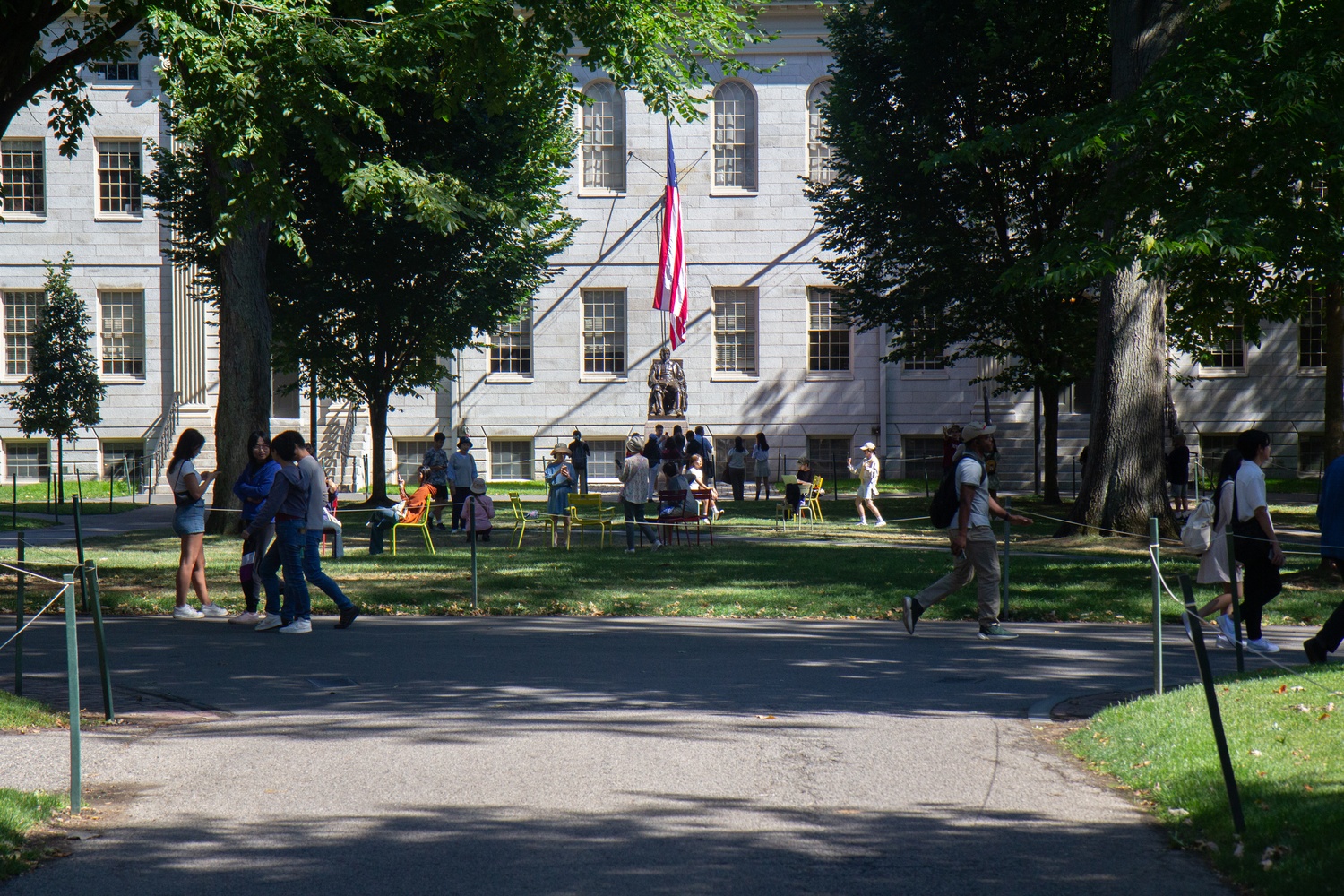
News
Summers Will Not Finish Semester of Teaching as Harvard Investigates Epstein Ties

News
Harvard College Students Report Favoring Divestment from Israel in HUA Survey

News
‘He Should Resign’: Harvard Undergrads Take Hard Line Against Summers Over Epstein Scandal

News
Harvard To Launch New Investigation Into Epstein’s Ties to Summers, Other University Affiliates

News
Harvard Students To Vote on Divestment From Israel in Inaugural HUA Election Survey
Trump Admin Asks Judge To Dismiss Harvard’s Lawsuit Against Threats to International Students

Lawyers for the federal government on Friday moved to dismiss Harvard’s lawsuit challenging the Trump administration’s attempts to prevent the University from hosting international students.
The filing comes one day after lawyers for the administration submitted a stipulation to the court declaring the DHS would not enforce the May 22 letter revoking Harvard’s Student and Exchange Visitor Program certification, which is necessary to host international students.
Harvard initially brought its lawsuit in response to the May 22 revocation, but the University amended its complaint after President Donald Trump issued an executive proclamation on June 4 barring foreign students from entering the United States to attend Harvard. Harvard argued that the proclamation violated the school’s First Amendment rights and was issued as retaliation to its protected speech.
To justify their motion to dismiss, the Trump administration’s lawyers argued that the May 22 revocation is now “moot” because of their Thursday filing, and separately maintained that the presidential proclamation is constitutional. The administration claimed that Trump has authority to block foreign nationals from entering the U.S. based on a determination that their attendance at Harvard “posed a serious risk to the nation.”
Harvard has challenged the administration’s invocation of broad presidential powers under the Immigration and Nationality Act, which it says does not give Trump the authority to ban Harvard students from entering the U.S. on nonimmigrant visas.
U.S. District Judge Allison D. Burroughs will now decide whether to dismiss the case — but so far, she has not appeared sympathetic to the government’s logic. She granted Harvard two preliminary junctions to block the proclamation and the May 22 SEVP revocation from taking effect. In her June 23 decision granting Harvard a preliminary injunction against the proclamation, she wrote that the proclamation lacked “legitimate grounding” and was unlikely to survive constitutional challenges.
It also remains unclear whether the government’s Thursday stipulation — to which Harvard did not agree — will succeed in removing the May 22 letter from the case.
The preliminary injunctions will remain in effect for the duration of the lawsuit unless overturned on appeal. The Trump administration appealed the injunction for the proclamation on June 27, and its brief to the First Circuit Court of Appeals is scheduled for August 25.
The government’s Friday filing also said that the DHS’ formal notice of intent to withdraw Harvard’s SEVP certification, which was issued on May 28, is still ongoing. The withdrawal notice gave the University 30 days to prove it had complied with regulations necessary to remain an SEVP certified institution.
On Friday, lawyers for the administration stated that Harvard has not challenged the notice of intent to withdraw — and “nor could they,” because the White House has not yet made a decision on whether to withdraw Harvard’s certification.
“Harvard will have to amend its complaint if it plans to challenge any future decision,” they wrote.
After the 30-day window closed in late June, a Harvard spokesperson wrote that the University had responded to the notice, without stating what documents had been shared with the government.
Harvard spokesperson Sarah E. Kennedy-O’Reilly wrote on Friday that the government’s motion “has no impact” on Harvard’s ability to enroll international students and scholars, but that the government’s May 22 revocation letter was “unlawful.”
“This motion illustrates that the government recognizes the unlawful nature of its effort to revoke Harvard’s SEVP certification in May. The University will continue to defend its rights—and the rights of its students and scholars,” Kennedy-O’Reilly wrote.
Spokespeople for the DHS and the Department of Justice did not immediately respond to a request for comment on Friday evening.
Several other federal agencies — including the State Department and Justice Department — and their leaders are also named in Harvard’s suit.
—Staff writer Samuel A. Church can be reached at samuel.church@thecrimson.com. Follow him on X @samuelachurch.
—Staff writer Cam N. Srivastava can be reached at cam.srivastava@thecrimson.com. Follow him on X @camsrivastava.
Want to keep up with breaking news? Subscribe to our email newsletter.
